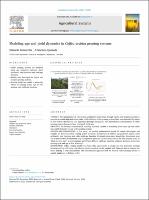Modeling age and yield dynamics in Coffea arabica pruning systems
Résumé
The maintenance of rejuvenated, productive plant tissue through regular and frequent pruning is essential to sustain high and stable coffee yields. Different coffee pruning systems have been described by means of well-written descriptions, and ingenious drawings and graphs. The mathematical representation of coffee pruning systems has never been attempted. Until now. To develop a mathematical modeling approach capable of describing plant tissue age and coffee bean yield dynamics for any coffee pruning system. In this paper, we develop mathematical models for simple (Nicaragua) and complex (El Salvador) coffee pruning system by using a special type of additive age-projection matrix, clock arithmetic, step functions, and coffee yield-age functions developed using expert knowledge. Simulations were run to answer three fundamental crop management questions: 1) how many years is the best pruning cycle, 2) when (at what age?) to start pruning, and 3) how different yield-age functions influence decisions on the best pruning cycle and age at first stumping?. Coffee pruning models can help coffee agronomists to design and test innovative pruning practices quickly, efficiently, and cheaply. Pruning models can be coupled with financial data to improve decision making in crop management. The mathematical approach used for Arabica coffee pruning systems is equally applicable to Robusta coffee.
Keywords
Delegation
Sede Central
Éditeur
Elsevier
Is part of
Agricultural Systems
Status
restrictedAccess
xmlui.dri2xhtml.METS-1.0.item-uri-link
https://doi.org/10.1016/j.agsy.2022.103450


